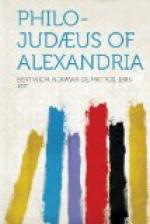The note of triumph rings through the political references to be found in the last parts of Philo’s allegorical commentary, and no doubt it was accentuated in the lost book which he added as an epilogue, or palinode, to his history of the embassy. God had again preserved his people, and discomfited their foes; recently-discovered papyri have revealed that the arch anti-Semites, Isidorus and Lampon, were tried at Rome and executed. Claudius was well-disposed to the Jewish race, and before the final storm there was a calm. Howbeit, after the death of Agrippa, in 44 C.E., Judaea became a Roman province, and under the rapacious governorship of Felix Florus and Cestius Gallus, the hostility of the people to the Romans grew more and more bitter. But in Alexandria there was tranquillity, or at least we know of no disquieting events during the next decade.
“Old age,” said Philo, “is an unruffled harbor,"[81] and the saying refers possibly to his own experience. For he must have died full of years and full of honors. Through his life he was the spiritual and philosophical guide, and finally he had become the champion of his people against their persecutors, giving dignity to their cause and inspiring respect even in their enemies. He was happy in the time of his death, for he did not live to see the destruction of the national home of his people and of that temple which he had loved to contemplate as the future centre of a universal religion. The disintegration of his own community at Alexandria followed full soon on the greater disaster; the temple of Onias was dismantled and interdicted against Jewish worship by Vespasian in the year 73 C.E., and though, as has been noted, this was not in itself of great importance, it is symbolic of the uprooting of national life in the Diaspora as well as in Palestine itself. On the downfall of Jerusalem in 70 C.E. many of the extreme anti-Roman party, known as the Zealots, fled to Alexandria and stirred up rebellion and dissension. Nothing but disaster could have attended the outbreak, but it is a sad reflection that the governor who put it down and ruthlessly exterminated the rebels was none other than Tiberius Alexander, the nephew of Philo, who was in turn procurator of Judaea and Egypt.




